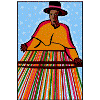Textiles, Merchandising and Fashion Design, Department of

Department of Textiles, Merchandising and Fashion Design: Faculty Publications
Document Type
Article
Date of this Version
2022
Citation
Published in Sustainable Materials and Technologies 31 (2022) e00367
doi:10.1016/j.susmat.2021.e00367
Abstract
Pliable and water-resistant protein fibers from feathers were developed via continuous one-step spinning and crosslinking using sucrose-tetra-aldehydes. Though flexible protein fibers from feathers were developed, poor wet stability and low tenacity still limit the large and high-end applications of feather-derived fibers. Despite that saccharide aldehydes are considered as an efficient and sustainable crosslinker, substantial concerns such as generation of formaldehyde, high consumption of modifiers, loss of mechanical properties, yellowing, and decline in dyeability of fibers, exist after crosslinking. In this work, we controlled structures of crosslinkers and incorporated disaccharide-tetra-aldehydes into a continuous wet-spinning line. No formaldehyde was generated in the whole process. Protein fibers with controlled aldimine crosslinkages had not only a 92% tenacity retention after immersed in water for 1 week but also a substantial increase in mechanical properties. The dry and wet tenacity of feather-derived fibers was 120% and 90% of wool, respectively. Moreover, crosslinking from disaccharide-tetra-aldehydes retained the color of fibers and minimized the consumption of amine groups, the dyeing sites, on keratin. No toxicity was introduced by crosslinking. This work promotes resource recovery from poultry wastes, decreases the reliance of fiber industry on petroleum-based products, and diminishes environmental impact of fiber industries.
Video
Yang SMT 2022 Pilot scale spinning.docx (36 kB)
Fig S1 & Table S1


Comments
Copyright © 2021 Elsevier B.V. Used by permission.